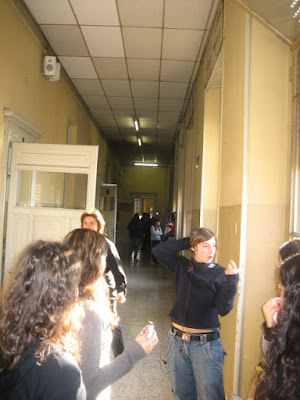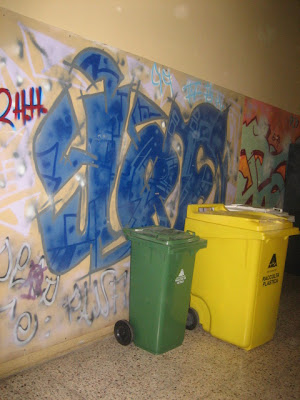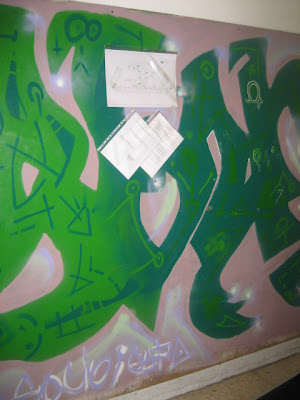The Italian School System.
Ok, I have had a bit of the January, for many reasons other than it being the post-holiday season, but we won't get into that here...But I'm back. This post is just something I had been working on since November.
So, what a paradox it is. I knew it would be culture shock entering school doors but from my experience of 2 months so far at my high school, it's quite sad and pathetic from so many view points. And there's no way I can't compare it to the American school system, so don't ask me to be unbiased. I just can't do it.
Let me just speak about the infrastructure and history of the high school before getting to the actual day-to-day routines. Firstly, the school is considered to be pretty average in overall performance and echelon of teachers and students alike. That said, here are some specifics about my particular school:
- The Carlo Dell'Acqua High School was founded 90 years ago. It has been renovated not once since its inception. The gray and puke-colored paint is chipping off and even parts of the walls and ceilings are crumbling.
- There are three branches of the high school spread out just outside the city center, all within a 10-15 minute walking distance to one another.
- Most toilets inside the school are turkish toilets. From what I hear, though, there is a normal (western?) toilets in some mysteriously hidden location in the school but I haven't once gone to the bathroom there not once and nor do I ever wish to. Toilet paper and soap dispenser replenishments aren't regularly scheduled, although I see cleaning crew on the premises daily.
- The entire school is graffitied (sp?) inside and out, especially classrooms.
- There is no cafeteria.
- There is no gym (although some colleagues would say that there is, and it consists of the 40'x50' blacktop courtyard where boys play soccer.)
- There is no library (although some colleagues would say that there is, and it consists of 3-4 bookshelves and 3-4 tables with 3-4 chairs at the top of the 2nd floor landing.)
- There is a computer lab and the computers are hooked up to cable modem. However, as I witnessed firsthand in a failed lesson, the internet connection is usually slower than 56k/dial-up and the computer date back from god knows when. All of them make that loud, crackling "I'm working really hard for you" type of noise that reminds me of my family's first computer circa the early 90s.
- In the (only) teacher's lounge, there is 1 functioning computer (read: dating sometime in the early 2000s) for 180 teachers to use. There are 2 printers (one is at least a decade old, the other about 7-8 years old) that frequently run out of ink, naturally, because of mentioned amount of teachers.
- There is 1 copy machine that frequently runs out of paper-- and copy paper does not necessarily get re-supplied often. When you do request paper, the computer tech has to come shuffling down the corridor just to put the paper in the machine for you, (apparently since teachers aren't capable), and inject some snide comments about how we teachers just eat paper here, at least three or four times in a row before leaving you to your task. The copy machine gets refilled perhaps once per day.
In all honesty, this school (and many Italian high schools) is probably on par with some of the poorest urban schools in the entire United States.
With that in mind, let's carry on to the daily functioning.
Time: Highschoolers in Italy get to spend not 5 but 6 days per week in this lovely, modern, technologically-capable, overly accommodating edifice. School hours are from 8:15am until 1:35pm with one 10 minute break from 10:55 until 11:05 for a snack...that is, if you're quick enough to -- eating in class and being late to class is frequently not acceptable (not that a verbal scolding does much other than possibly a slight embarrassment on the student's part.) At the end of each period (or is it the beginning? I haven't quite figured that out yet) the bell rings once to signify the end (or beginning?) of a new period. Oh, and during that ten-minute break, pop/rock/dance music is blasted throughout every single hallway by the "bidelli" or women/men that serve as hall monitors and general school wardens. See my video of the daily break here. Most of these uniformed school guards/general caretakers are pretty cranky, too, and reluctantly use the formal You with all teachers, despite the fact that most of them think they do more work that teachers do. (From what I've seen so far of the amount of work most Italian teachers do compared to the bidelli, I wouldn't doubt that.) Oh, and if you want chalk, you have to ask the bidelli. They are the protectors of chalk.
Space: Students do not change class; the teachers do. Teachers have a very tiny "casella" (drawer with a hinged door and key lock) in which to put all their teacherly belongings, personal items and any other items that you could possibly think of shoving into a 12"x14"x6" space. To say that each classroom is bare bones = nail meets head. Desks, teacher's desk, chairs, blackboards that generally are no larger than 5'x2'. Erasers are bath sponges. Bits of chalk the size of my fingernail. Maybe a cabinet, if you're lucky. (But to store what? Teachers don't have classrooms, they have their caselle!) The division, sharing and lack of space creates a very interesting dynamic in the school. More on this in just a bit.
Rules and Discipline: Basically None .
Note: As we all know in Italy, the exception is the rule. As far as I know, school rules do exist. Nevertheless, and much less Italy in general, enforcement and implementation does not. (John Dewey would be so proud to know that the Dell'Acqua functions as a microcosm of society!) I mean, it's like the reverse tree-falling-in-the-forest dilemma: if a rule is written on paper but no one enforces it, does it really exist? Let me explain more: first thing you need to know is that Italian students do not shut the hell up. EVER. Moving on. I've actually devised several 'games/rules' so that the students will stop talking when I'm talking or when another student or reading/talking. I draw a vertical line on the blackboard and erase a big chunk whenever a student is talking when he shouldn't be, not paying attention when he should be, is unprepared, horsing around, etc. If the line becomes completely erased, then we have a written or oral quiz or an essay to write, all which count for a grade. I must say, it works fairly well.
Roles: Each classroom has a class coordinator, sort of like homeroom teacher but much more responsible for keeping general tabs on students. Disciplinary action exists momentarily, mainly when one teacher decides she needs to execute crowd control. It's like this: imagine a riot and a police barricade-- the rioters always inching the barricade further and further while police officers fail to edge them back. On the same page? Ok. Teachers frequently yell at the students but it's futile because beyond the verbal tirade, there is no consequence. I'm not saying that I'm a keen supporter of typically American punishment methods such as detention or suspension. But I do believe there are such things as positive or possibly rewarding games and/or consequences that a teacher can impose on her students in order to keep a basic line of order in the classroom. If a teacher is yelling at her students on a daily basis (even just to get them to shut the f@^& up), and there is no consequence, then of course the action will continue. It simply becomes habit and students will push the boundaries as far as they possibly can. Therefore, it's a constant tug of war to even execute carefully-planned lessons. Most exercises that I plan for classes here take twice as long as they took when I taught at Paramus High School. But I don't have the luxury of time here either, because each class is 50 minutes long (just as they were at PHS.) I should mention that the students have "libretti" which are little passport-like books that serve as student-IDs/report cards/progress reports all in one. The teacher writes in the libretto, the student must then give it to his parent and have him/her sign whatever page the teacher wrote on (whether it be for a grade or behavior comments) and that's pretty much it. What a crap system, IMO. Today I wrote comments in 2 students' libretti (simply because they were acting like uncontrollable animals in class) but probably nothing will happen. A slap on the hand from the parents, if that. Also, another thing which I find funny, is that students actually are given tickets (just like the ones cops give you-- ie, the tickets are government-issued), for smoking. If caught smoking indoors, the student has to pay 25 euros, most likely mailed in to the local government or perhaps directly at the post office (where all bills are paid.)
Consequences: Dire. While there are a few motivated, energetic, original teachers at the high school, most teachers don't really lesson plan but just wing it, only using the one textbook required for the class. (For all you non-teachers: most of the time it takes hours to plan even just one lesson effectively. It's an exhausting experience that only gets less-exhausting with time....and I'm still a newbie.) Working at an American high school, I'm used to having my own classroom chock full of materials, closets busting four wall-covering white boards on 2 adjacent walls, an overhead projector, a transparency projector, a stereo, numerous computers and printers (including a computer and printer just for the teacher) maps, decor, and pretty much anything else I could possibly think of that I would need to bring into a classroom to make it feel like a place for learning, not a place to be locked up in for several hours a day.
So. What I've realized so far about the general dynamic of teacher and student? As I mentioned before, the division, sharing and lack of space defines the relationships between everyone. Teachers have absolutely no personal space-- they actually have no space at all. So it's no wonder that as soon as teachers here run off and carry on with their lives as soon as they are finished with their classes for the day. It's no wonder that teachers feel absolutely no attachment to their students and never succeed in knowing any of their students' names (A full time teacher has 6 classes in Italy. A full-time teacher in the US has 5 classes. Within 3 weeks, I knew every single child's name.) It's no wonder that class management doesn't exist; because the students are confined to one rectangular or square space for the entire day, they become the rulers of their space. How can a teacher set a tone when s/he is the one entering the students' space each day? Do you really think that the students will listen to and abide by each rotating teachers' rules and guidelines (which change every 50 minutes)? Do you think that teachers can or are willing to develop relationships with their students, get to know them personally, understand their hardships, their learning intelligences, their home life situations? Hardly. So having just a 'casella' as your own personal and professional space is sending a terrible, inherent message to the teacher that they don't even realize because they haven't experienced any other scholastic system: you are just an employee here; just get out after your work is done; don't bother developing relationships with your students to better understand their background, home life, or learning intelligences. There is literally no place to go except for the teacher's room (which is for the most part, always freezing-- another subtle message?) to go to your casella and use the 1 functioning computer amongst 180 teachers.
While my personal teaching philosophy is that the students guide your curriculum-- your students' learning processes, opinions, likes/dislikes, etc must act as a general guide on how to plan your courses. For example, I'm not going to plan an English lesson where my class must debate for 50 minutes about stem cell research when I know they are extremely reticent and need tons of coaxing with simpler methods. And if you don't plan lessons that interest them in the slightest, how the hell can you be a successful teacher with you get through to them and have them learn successfully anyway?
As for me, with limited time (I see 12 different classes per week; none repeat), extremely limited resources, it's a pretty desperate feeling. Nonetheless, as they say, when you do what you love best, you still find a way to make it enjoyable and emanate that passion to your students. It's not always that easy (I've already had my share of failed lessons for any numbers of reasons, including horrible class behavior, malfunctioning printer and/or copier, or simply just not having chosen the right sort of lesson for that class and level.) But then some days you get some kids who are policing the other students for you because he or she wants to learn. Or you enter a class and a student immediately comes up to you with a huge grin and asks, "What will we learn today!?" or you see that look in their eye that says, "Woah, I think I get it now."
And that makes it all worth it.
A few pics:

I love this class! 2nd year students.

During the 10 minute recess.

Some nice spackle work there.

And even nicer artwork on the walls.

Stairway leading to... nothing.

More vandal-- err, artwork.

Gettin' some Italian java.

Hello, young squires!

All the coffee options make mah head asplode.

Two great students. I teach them American history.
0 comments :
Post a Comment